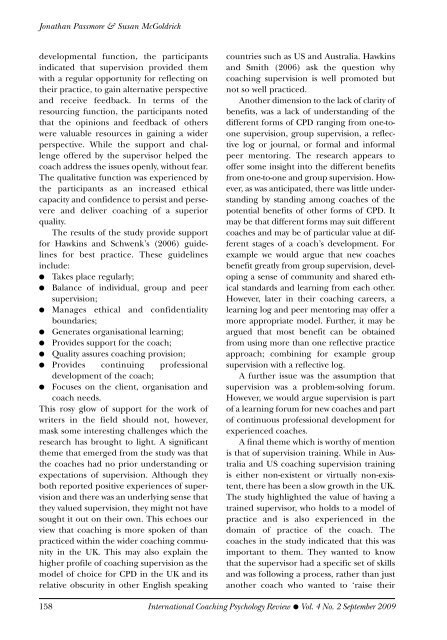International Coaching Psychology Review, 4.2, September 2009
International Coaching Psychology Review, 4.2, September 2009
International Coaching Psychology Review, 4.2, September 2009
Create successful ePaper yourself
Turn your PDF publications into a flip-book with our unique Google optimized e-Paper software.
Jonathan Passmore & Susan McGoldrick<br />
developmental function, the participants<br />
indicated that supervision provided them<br />
with a regular opportunity for reflecting on<br />
their practice, to gain alternative perspective<br />
and receive feedback. In terms of the<br />
resourcing function, the participants noted<br />
that the opinions and feedback of others<br />
were valuable resources in gaining a wider<br />
perspective. While the support and challenge<br />
offered by the supervisor helped the<br />
coach address the issues openly, without fear.<br />
The qualitative function was experienced by<br />
the participants as an increased ethical<br />
capacity and confidence to persist and persevere<br />
and deliver coaching of a superior<br />
quality.<br />
The results of the study provide support<br />
for Hawkins and Schwenk’s (2006) guidelines<br />
for best practice. These guidelines<br />
include:<br />
● Takes place regularly;<br />
● Balance of individual, group and peer<br />
supervision;<br />
● Manages ethical and confidentiality<br />
boundaries;<br />
● Generates organisational learning;<br />
● Provides support for the coach;<br />
● Quality assures coaching provision;<br />
● Provides continuing professional<br />
development of the coach;<br />
● Focuses on the client, organisation and<br />
coach needs.<br />
This rosy glow of support for the work of<br />
writers in the field should not, however,<br />
mask some interesting challenges which the<br />
research has brought to light. A significant<br />
theme that emerged from the study was that<br />
the coaches had no prior understanding or<br />
expectations of supervision. Although they<br />
both reported positive experiences of supervision<br />
and there was an underlying sense that<br />
they valued supervision, they might not have<br />
sought it out on their own. This echoes our<br />
view that coaching is more spoken of than<br />
practiced within the wider coaching community<br />
in the UK. This may also explain the<br />
higher profile of coaching supervision as the<br />
model of choice for CPD in the UK and its<br />
relative obscurity in other English speaking<br />
countries such as US and Australia. Hawkins<br />
and Smith (2006) ask the question why<br />
coaching supervision is well promoted but<br />
not so well practiced.<br />
Another dimension to the lack of clarity of<br />
benefits, was a lack of understanding of the<br />
different forms of CPD ranging from one-toone<br />
supervision, group supervision, a reflective<br />
log or journal, or formal and informal<br />
peer mentoring. The research appears to<br />
offer some insight into the different benefits<br />
from one-to-one and group supervision. However,<br />
as was anticipated, there was little understanding<br />
by standing among coaches of the<br />
potential benefits of other forms of CPD. It<br />
may be that different forms may suit different<br />
coaches and may be of particular value at different<br />
stages of a coach’s development. For<br />
example we would argue that new coaches<br />
benefit greatly from group supervision, developing<br />
a sense of community and shared ethical<br />
standards and learning from each other.<br />
However, later in their coaching careers, a<br />
learning log and peer mentoring may offer a<br />
more appropriate model. Further, it may be<br />
argued that most benefit can be obtained<br />
from using more than one reflective practice<br />
approach; combining for example group<br />
supervision with a reflective log.<br />
A further issue was the assumption that<br />
supervision was a problem-solving forum.<br />
However, we would argue supervision is part<br />
of a learning forum for new coaches and part<br />
of continuous professional development for<br />
experienced coaches.<br />
A final theme which is worthy of mention<br />
is that of supervision training. While in Australia<br />
and US coaching supervision training<br />
is either non-existent or virtually non-existent,<br />
there has been a slow growth in the UK.<br />
The study highlighted the value of having a<br />
trained supervisor, who holds to a model of<br />
practice and is also experienced in the<br />
domain of practice of the coach. The<br />
coaches in the study indicated that this was<br />
important to them. They wanted to know<br />
that the supervisor had a specific set of skills<br />
and was following a process, rather than just<br />
another coach who wanted to ‘raise their<br />
158 <strong>International</strong> <strong>Coaching</strong> <strong>Psychology</strong> <strong>Review</strong> ● Vol. 4 No. 2 <strong>September</strong> <strong>2009</strong>

















